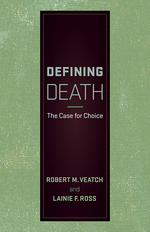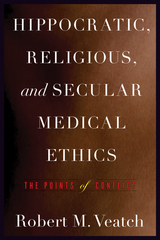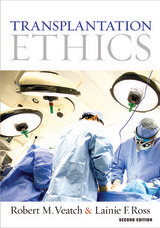
Research with human subjects has long been controversial because of the conflicts that often arise between promoting scientific knowledge and protecting the rights and welfare of subjects. Twenty-five years ago the National Commission for the Protection of Human Subjects of Biomedical and Behavioral Research addressed these conflicts. The result was the Belmont Report: Ethical Principles and Guidance for Research Involving Human Subjects, a report that identified foundational principles for ethical research with human subjects: respect for persons, beneficence, and justice.
Since the publication of Belmont, these three principles have greatly influenced discussions of research with human subjects. While they are often regarded as the single-most influential set of guidelines for biomedical research and practice in the United States (and other parts of the world), not everyone agrees that they provide adequate guidance. Belmont Revisited brings together a stellar group of scholars in bioethics to revisit the findings of that original report. Their responses constitute a broad overview of the development of the Belmont Report and the extent of its influence, especially on governmental commissions, as well as an assessment of its virtues and shortcomings.
Belmont Revisited looks back to reexamine the creation and influence of the Belmont Report, and also looks forward to the future of research—with a strong call to rethink how institutions and investigators can conduct research more ethically.

From prescriptions to pain killers to transplantation of human organs, the perplexities of medical ethics extend far beyond the confines of medicine. This book offers over 100 engrossing case studies that guide the reader to an understanding of the ethical aspects of medical care. The cases illustrate dilemmas arising in everyday practice—what to tell a dying patient, selecting a surgical approach, choosing between brand-name and generic drugs—as well as the ethical consequences of advanced technology—prenatal diagnosis that might result in the decision to abort, or keeping an irreversibly comatose patient alive with support methods.
Robert M. Veatch first shows readers how to identify ethical issues and points out that an important element in making a decision is to identify the person responsible for it. Then, in analyzing the classical moral question "What is the right thing to do?" he cites situations that were actually faced by patients and medical professionals. He explores a number of specific ethical problems in contemporary medicine: abortion, sterilization, contraception, transplantation, hemodialysis, genetic counseling, and human experimentation, among others. The last chapter focuses on death and dying.
Ethical positions are never forced upon the reader. Instead, the author is careful to present alternatives and to discuss the consequences of a particular decision. His book is written for patients, their families and friends, nurses, technicians, counselors, social workers, physicians, employers, and lawyers—indeed for anyone affected by the burgeoning power of medical intervention.

New technologies and medical treatments have complicated questions such as how to determine the moment when someone has died. The result is a failure to establish consensus on the definition of death and the criteria by which the moment of death is determined. This creates confusion and disagreement not only among medical, legal, and insurance professionals but also within families faced with difficult decisions concerning their loved ones.
Distinguished bioethicists Robert M. Veatch and Lainie F. Ross argue that the definition of death is not a scientific question but a social one rooted in religious, philosophical, and social beliefs. Drawing on history and recent court cases, the authors detail three potential definitions of death — the whole-brain concept; the circulatory, or somatic, concept; and the higher-brain concept. Because no one definition of death commands majority support, it creates a major public policy problem. The authors cede that society needs a default definition to proceed in certain cases, like those involving organ transplantation. But they also argue the decision-making process must give individuals the space to choose among plausible definitions of death according to personal beliefs.
Taken in part from the authors' latest edition of their groundbreaking work on transplantation ethics, Defining Death is an indispensable guide for professionals in medicine, law, insurance, public policy, theology, and philosophy as well as lay people trying to decide when they want to be treated as dead.

The essays in Ethics, Trust, and the Professions probe the nature of the fiduciary relationship that binds client to lawyer, believer to minister, and patient to doctor. Angles of approach include history, sociology, philosophy, and culture, and their very multiplicity reveals how difficult we find it to formulate a code of ethics which will insure a relationship of trust between the professional and the public.

Where should physicians get their ethics? Professional codes such as the Hippocratic Oath claim moral authority for those in a particular field, yet according to medical ethicist Robert Veatch, these codes have little or nothing to do with how members of a guild should understand morality or make ethical decisions. While the Hippocratic Oath continues to be cited by a wide array of professional associations, scholars, and medical students, Veatch contends that the pledge is such an offensive code of ethics that it should be summarily excised from the profession. What, then, should serve as a basis for medical morality?
Building on his recent contribution to the prestigious Gifford Lectures, Veatch challenges the presumption that professional groups have the authority to declare codes of ethics for their members. To the contrary, he contends that role-specific duties must be derived from ethical norms having their foundations outside the profession, in religious and secular convictions. Further, these ethical norms must be comprehensible to lay people and patients. Veatch argues that there are some moral norms shared by most human beings that reflect a common morality, and ultimately it is these generally agreed-upon religious and secular ways of knowing—thus far best exemplified by the 2005 Universal Declaration on Bioethics and Human Rights—that should underpin the morality of all patient-professional relations in the field of medicine.
Hippocratic, Religious, and Secular Medical Ethics is the magnum opus of one of the most distinguished medical ethicists of his generation.

Government agencies and commissions, courts, and legislatures have during the past several decades produced reports, rendered decisions, and passed laws that have both defined the fundamental issues in the field of bioethics and established ways of managing them in our society. Providing a history of these key bioethical decisions, this Source Book in Bioethics is the first and only comprehensive collection of the critical public documents in biomedical ethics, including many hard-to-find or out-of-print materials.
Covering the period from 1947 to 1995, this volume brings together core legislative documents, court briefs, and reports by professional organizations, public bodies, and governments around the world. Sections on human experimentation, care of the terminally ill, genetics, human reproduction, and emerging areas in bioethics include such pivotal works as "The Nuremberg Code," "The Tuskegee Report," and "In the Matter of Baby M," as well less readily available documents as "The Declaration of Inuyama," the Council for International Organizations of Medical Sciences statement on genetic engineering, and "The Warnock Committee Report" on reproductive technologies from the United Kingdom. Three eminent scholars in the field provide brief introductions to each document explaining the significance of these classic sources.
This historical volume will be a standard text for courses in bioethics, health policy, and death and dying, and a primary reference for anyone interested in this increasingly relevant field.

This literally "refreshing" collection is based on the notion that the future of bioethics is inseparable from its past. Seminal works provide a unique and relatively unexplored vehicle for investigating not only where bioethics began, but where it may be going as well. In this volume, a number of the pioneers in bioethics—Tom Beauchamp, Lisa Sowle Cahill, James Childress, Charles E. Curran, Patricia King, H. Tristram Engelhardt, William F. May, Edmund D. Pellegrino, Warren Reich, Robert Veatch and LeRoy Walters—reflect on their early work and how they fit into the past and future of bioethics. Coming from many disciplines, generations, and perspectives, these trailblazing authors provide a broad overview of the history and current state of the field. Invaluable to anyone with a serious interest in the development and future of bioethics, at a time when new paths into medical questions are made almost daily, The Story of Bioethics is a Baedeker beyond compare.

Three decades after the first heart transplant surgery stunned the world, organs including eyes, lungs, livers, kidneys, and hearts are transplanted every day. But despite its increasingly routine nature-or perhaps because of it-transplantation offers enormous ethical challenges. A medical ethicist who has been involved in the organ transplant debate for many years, Robert M. Veatch explores a variety of questions that continue to vex the transplantation community, offering his own solutions in many cases.
Ranging from the most fundamental questions to recently emerging issues, Transplantation Ethics is the first complete and systematic account of the ethical and policy controversies surrounding organ transplants. Veatch structures his discussion around three major topics: the definition of death, the procurement of organs, and the allocation of organs. He lobbies for an allocation system-administered by nonphysicians-that considers both efficiency and equity, that takes into consideration the patient's age and previous transplant history, and that operates on a national rather than a regional level.
Rich with case studies and written in an accessible style, this comprehensive reference is intended for a broad cross section of people interested in the ethics of transplantation from either the medical or public policy perspective: patients and their relatives, transplantation professionals, other health care professionals and administrators, social workers, members of organ procurement organizations, and government officials involved in the regulation of transplants.

Although the history of organ transplant has its roots in ancient Christian mythology, it is only in the past fifty years that body parts from a dead person have successfully been procured and transplanted into a living person. After fourteen years, the three main issues that Robert Veatch first outlined in his seminal study Transplantation Ethics still remain: deciding when human beings are dead; deciding when it is ethical to procure organs; and deciding how to allocate organs, once procured.
However, much has changed. Enormous strides have been made in immunosuppression. Alternatives to the donation model are debated much more openly—living donors are used more widely and hand and face transplants have become more common, raising issues of personal identity. In this second edition of Transplantation Ethics, coauthored by Lainie F. Ross, transplant professionals and advocates will find a comprehensive update of this critical work on transplantation policies.
READERS
Browse our collection.
PUBLISHERS
See BiblioVault's publisher services.
STUDENT SERVICES
Files for college accessibility offices.
UChicago Accessibility Resources
home | accessibility | search | about | contact us
BiblioVault ® 2001 - 2024
The University of Chicago Press









